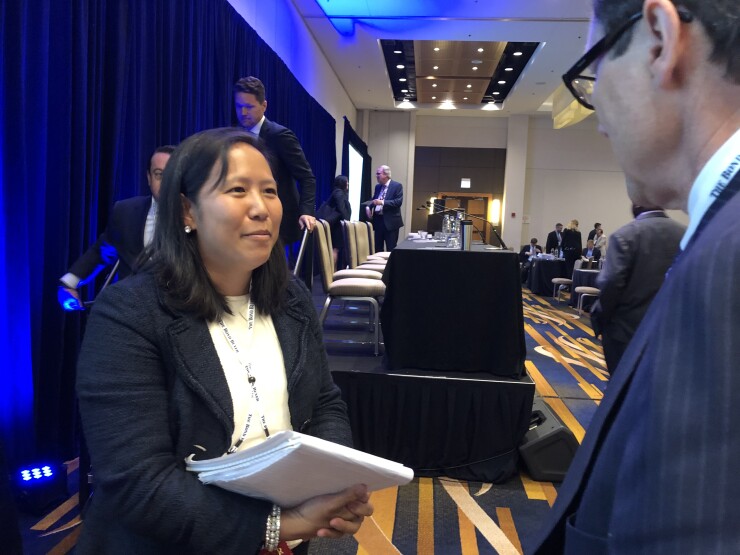Chicago Mayor Lori Lightfoot’s administration has tucked $39 million into the proposed 2020 budget to make up any upcoming shortfall in property tax collections to meet its statutory pension fund contributions.
The issue over whether the city must legally make up the difference between what’s levied and what’s collected was the subject of
The dispute also prompted the city to file its own lawsuit challenging state Comptroller Susana Mendoza’s garnishment of the city’s state grant funding under an intercept mechanism the office began enforcing last year.
The funds being budgeted for in the $4.5 billion 2020 corporate budget will cover the differential between the taxes levied in 2018 and collected in 2019 — which is typically about 2% to 2.5% short and referred to the “loss in collection” — and due in 2020, the administration said. The former administration of Rahm Emanuel who left office in May took the position that the city was not obligated to make up the difference.
“As part of the 2020 budget, the city responsibly included $39 million to ensure that the pension funds would receive the entire allocated amount in the event that we received an adverse ruling from the court,” the administration said in a statement. “This follows a pattern in which Chicago continues to take steps to address concerns about its pension responsibilities, and underscores the administration's commitment to better fiscal management in this budget and for the future.”
Chicago’s chief financial officer Jennie Huang Bennett said no decision has been made yet on whether the city will continue the practice over the long-term or whether it would appeal the court’s decision or drop the litigation. “We are still evaluating exactly what the ruling means and how we are going to address it,” Bennett said this week.

A legal source following the case said the city was inclined not to appeal the ruling and to drop its own case, paving the way for intercepted grant dollars to go to the funds to cover shortfalls over the last several years.
A total of $11.2 million has so far been intercepted and sent to the city’s firefighters’ fund and $20.8 million has gone to the police fund with another $2.5 million set for diversion this month for police, according to comptroller spokesman Abdon Pallasch. The city must also make up for shortfalls to its municipal and laborers' funds.
The comptroller has so far forwarded $4.6 million of intercepted state grants to the city's municipal fund and $2.5 million to the laborers' fund for claims filed on past shortages.
Besides forcing Chicago’s hand, the decision that came down last month from Cook County Circuit Court Judge Sophia Hall in Retirement Board of the Firemen’s Annuity and Benefit Fund v. Chicago stands to influence the actions of the local governments across the state.
Local governments must make actuarial-based contributions to their public safety funds and the Illinois Municipal Retirement Fund, which covers general municipal employees outside Chicago and Cook County. Chicago is currently adhering to a non-actuarial ramp with set payments laid out in statute through 2020 when an actuarial contribution then hits for police and firefighters and through 2022 when it hits for municipal and laborers.
The comptroller began in early 2018 enforcing pension code changes that allow the intercept of grant funds to Chicago and various state tax funds to all other Illinois municipalities to cover shortfall claims filed by local pension funds.
Chicago challenged demands from its funds to make the full statutory payment and the firefighters filed a lawsuit earlier last year to resolve the issue. The city in May countered by filing its own, separate lawsuit against three of its four funds and the comptroller seeking to block the state intercepts.
The
The
Judge Hall sided with the fund. “The legislature…provided that the fund could bring a mandamus action to compel the city to pay the entire required contribution which is ‘guaranteed.’ No statutory language modifies the amount of payment to the fund of the required contribution dependent upon the amount collected by the city from the tax levy,” Hall wrote in her opinion.
Hall also noted that the statutes permit the city to make up the loss of collection through non-property revenue or through the garnishment of the city’s state grant funds. “This court finds for the fund and against the city declaring that the city has not met its obligation under the pension code to pay the amount of the required contribution for 2016, 2017, and 2018,” Hall wrote.
The city’s funding changes are supposed to put the funds on a course to reach a 90% funded ratio by 2055 for two of the funds and 2057 for the other two. The city is carrying $30 billion of net pension liabilities and the system is less than 30% funded. Chicago’s police and fire contribution will rise by nearly $280 million next year to meet the actuarial payment due in payment year 2021.
In addition to Chicago, pension funds from the Chicago suburb of Harvey, North Chicago, and East St. Louis have filed intercept claims with the comptroller, with a handful of others triggered for IMRF shortages.





